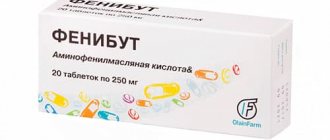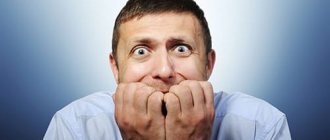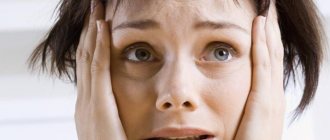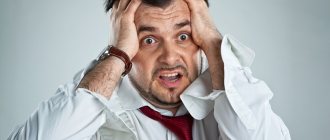Home>Articles>Panic attacks after alcohol
quick menu (hide)
- Causes of panic attacks
- Symptoms of occurrence
- Physical manifestations
- Treatment of panic attacks
- Aids
- Medications
- Sport as treatment
Panic attacks and alcohol - these factors are not at all inextricably linked. In some people, this condition is a consequence of taking minimal doses of alcohol (no more than 30 grams per day). This amount is considered by many people to be a simple antidepressant, due to its ability to stop the release of the anxiety hormone - adrenaline. But on the other hand, such a dose is poison, as it causes mental problems, provoking a conflict between the conscious and subconscious “I” of a person.
How does a panic attack form?
The only cause is the consumption of alcoholic beverages. Panic attacks after alcohol what to do? - only those people who have learned from an early age that alcohol is an antidepressant can ask such a question. The person sought to drink alcohol to stimulate positive emotions. But he will only receive:
- imbalance between the autonomic and sympathetic nervous systems,
- threat of delirium tremens
- and panic attacks.
The mechanism for the formation of the negative effects of psychoactive substances, which include alcohol, along with drugs, is quite simple. Ethanol can saturate the brain with dopamine. After which the nervous system is exhausted and its production weakens. for natural dopamine levels to return.
Those who drink alcohol regularly reduce dopamine levels to critical levels, which is a prerequisite for a panic attack.
Many people mistakenly perceive blocking dopamine antagonists with alcohol as a positive thing. A one-time release of dopamine momentarily immerses a person in euphoria and reduces the perception of anxiety and fear. In the absence of these feelings, the body triggers a reaction mechanism that ends in an attack.
Important!
A panic attack is an attack of inexplicable, severe fear. It is accompanied by a feeling of horror and elements of disruption of the autonomic nervous system.
Particularly severe attacks develop in a person with a hangover. This is a consequence of his poisoning with the destruction products of alcohol and standard experiences. A severe hangover attack causes wild fear in a person, increased adrenaline levels, and uncontrollable anxiety . In some cases, the attack is associated with the desire to quit drinking and justifying oneself for an unsuccessful attempt.
Originally Answered: Why do I have panic attacks after drinking alcohol? – simple. This is a disagreement between the desire to drink alcohol, which becomes a consequence of developing alcoholism, and the understanding that alcohol is poison. An anxious and suspicious personality makes the attack emotionally charged, causing increased fear.
Diagnostic methods
Deterioration of the psycho-emotional state after the beginning, and even more so, the completion of the treatment of alcoholism, is a reason for immediate contact with a psychotherapist. Depression itself is dangerous for the development of psychosomatic diseases, and in severe, advanced cases, attempts to commit suicide. However, for an alcohol addict, such a state is fraught with a breakdown and a return to drunkenness.
To diagnose post-alcohol depression, doctors at the Leto clinic use special questionnaires that allow them to assess how severe the disorder is and whether the risk of suicide is high. However, accompanying somatic symptoms require a more thorough examination - they must be differentiated from chronic diseases, which often occur against the background of alcoholism.
At the initial stage of diagnosis, a standard “set” of studies is recommended: general clinical tests, ultrasound, cardiogram, Dopplerography; to assess the condition of the liver parenchyma, it is advisable to do elastography. If any pathologies are detected, a more in-depth examination is carried out.
Symptoms
Panic attacks caused by alcohol initially do not manifest themselves in any way. Everything inside a person is boiling. The patient does not know where to go to relieve the condition. While physical pain can be relieved with medications, there is no way to cope .
Such attacks can be observed in people of a certain type:
- those suffering from hypochondria, afraid of injury, illness and infection,
- prone to hysteria
- suffering from obsessive ideas
- epileptics.
The possibility of an attack is higher in people who have congenital or acquired diseases of the heart and blood vessels as a result of drunkenness. Alcohol causes an increased fear of death . Everything goes in a circle: fear causes the synthesis of catecholamine, which leads to an attack.
Systematic alcohol abuse is the cause of pathologies of the endocrine apparatus. Adrenal tumors, thyrotoxicosis and alcohol abuse stimulate the release of adrenaline, which causes a panic attack.
Drinking alcohol causes abnormalities in the functioning of some internal organs, increases phobias, aggravates mental illnesses and depressive states. The short-term pleasure from drinking alcohol is replaced by:
- apathy,
- withdrawal into oneself,
- anxious observation of the inner world,
- fears of developing alarming symptoms.
Allergic reaction as a probable cause of death during a hangover
One of the reasons why a person died from a hangover may be an allergic reaction to alcohol, called Quincke's edema . In most cases, it occurs when a person is allergic to one of the many ingredients that make up the drink. This can be grapes, cereals and other components used in one or another method of preparing alcohol. Also, an allergic reaction can occur due to intolerance to tyramine and histamine. These elements are found in fermented drinks, especially red wine.
Ethanol itself is not an allergen, but it promotes gastrointestinal permeability, accelerating the absorption of intestinal and stomach contents. At the same time, it reduces the ability of the pancreas and liver to neutralize toxic substances. Thus, incompletely processed proteins, which are very strong allergens . The immune response to this is quite slow and manifests itself initially in the form of itching and hives.
More dangerous manifestations are rapid reactions, one of which is Quincke's edema. This is a very fast and extremely unpredictable allergic reaction. It is simply impossible to recover from it on your own.
Its symptoms are the following:
- panic;
- skin itching;
- swelling of the larynx;
- swelling of the face.
Physical manifestations of panic attacks
Before a person feels an attack of overwhelming fear, he experiences:
- dry mouth,
- lump in throat
- lack of air,
- increased sweating,
- chills,
- numbness of hands and feet,
- frequent urge to urinate.
The symptoms of the onset of an attack vary from person to person. There may be fear of death, madness, severe anxiety, an incessant feeling of tension, and increased blood pressure. Fainting also .
Attacks are not excluded in people with reduced immunity. Alcohol is a carcinogen that can disrupt the human immune system.
Signs of attacks after drinking alcohol do not have two components:
- presence of intoxication,
- vegetative-vascular disorders.
The second component is characterized by extensive symptoms, including a nonspecific complex - damage to the gastrointestinal tract, respiratory organs, heart and blood vessels, and genitourinary area. cannot be detected during examinations . Doctors attribute this to a high level of anxiety, which is the impetus for the appearance of symptoms.
The mental side of the appearance of fear
The appearance of anxiety can be explained not only by symptoms of poisoning of the body. Psychological components are also important. The severity of panic increases in those patients who are trying to find a way out of life’s problems in alcohol.
Dissatisfaction with family, problems at work, failures in love. All this is filled with another dose of alcohol. Severe intoxication causes panic and shame from the realization that a person is not able to control himself. This makes the situation even worse. Such patients suffer not only from panic attacks, but also from depression.
But the feeling of guilt arises only if the patient’s center responsible for memory has not yet been damaged. But more often, addicts experience short-term memory lapses. This can also cause fear . Such people do not remember where they drank, with whom, what they did and how they behaved. It scares them. For some, their memory is restored after another dose of alcohol, others learn the truth from their drinking buddies.
Memory loss explains the way some alcoholics behave. Immediately after drinking, they lose adequacy and may show aggression, but after sobering up they do not remember anything that happened. After loved ones tell them about how they behaved, stress and panic appear, followed by shame, since the situation cannot be corrected.
Treatment of panic attacks after alcohol
It will not be possible to eliminate an attack that has already begun on your own. There are no magic cures for this disease. Taking antidepressants, physical activity, massage - all this is not serious. The main thing for a person prone to attacks is to work on himself.
First you need to give up alcohol. If a panic attack was observed after each dose, it means that alcohol in any quantity and for any reason is prohibited .
It has been noticed that the more a person strives to get rid of attacks, the higher their strength and frequency.
Why do people drink? True (psychological) causes of vice
Probably almost every person in our country knows at least something about the dangers of alcohol. However, the popularity of heavy libations during the holidays is not considered something out of the norm.
Why do people deliberately harm their health? Why is a person who does not drink alcohol necessarily considered “something different”?
The reasons for this phenomenon precisely relate to the field of psychology.
Initially, alcohol has a relaxing effect on the body, it reduces control and blurs some of the norms that a person is used to limiting himself to.
It has also been noted that taking small doses of alcohol allows you to temporarily forget about some difficulties or problems.
This is why those who are afraid to solve their difficulties and prefer to “run away” from problems are most vulnerable to developing an addiction.
Why do you think people, knowing the harm of high doses of alcohol, continue to abuse it? Sometimes because they cannot control the amount they drink, and this is a very alarming sign.
But there are other reasons.
The main reason why it is so difficult to give up alcohol is that alcohol provides something positive in solving problems. True, in excess doses it requires an exorbitant price in return - from loss of health and family to sudden death.
That is why it is so important to remember under what circumstances a person is inclined to use excessive amounts of it and what exactly it gives him.
- Does he become relaxed, open and emotionally relaxed in company?
- Does he allow himself courage or even aggression that he has been holding back for a long time?
- Allows himself to become carefree for a while and not constantly think about the imperfections of himself and the world?
A competent specialist will help you look deep into yourself and find individual reasons - what pushes people to solve life problems with the help of alcohol.
If a shy, insecure person gets used to feeling confident and courageous with the help of alcoholic drinks, then consider that the beginning of the formation of addiction has begun.
In the future, he will not think that it is worthwhile to engage in personal growth, the formation of healthy self-esteem, and the acquisition of new communication skills.
He will choose the easier way - drinking alcohol.
And indeed, for some time a person will notice an improvement in relationships with others, the ease of acquiring new contacts and acquaintances. However, later it will become clear that this well-being is imaginary, the friends acquired are only for fun, and new acquaintances are not so reliable.
Depression and anxiety gradually begin to increase, and the longer the “experience” of use, the more difficult it is to get rid of them.
Trying to get rid of the negative emotions that arise from the realization that the problems have not disappeared, a person will again and again resort to the help of alcohol.
And sometimes it happens that it is no longer possible to break this vicious circle without the help of a specialist. And a competent specialist will help you find a path to positive goals without the help of alcohol.
Dependent and codependent
Separately, it is necessary to say about those who are nearby who support the acquisition of an addiction.
These people present themselves to society as “sufferers” bearing a heavy cross in life. But in fact, loved ones who are close to a person who abuses alcohol make their feasible contribution to the formation and strengthening of addiction.
After talking with such people, you can note to yourself that they like to complain about their “hard lot,” but they categorically do not accept attempts to get rid of the negative burden.
In the treatment of alcoholism, there is a whole psychotherapeutic branch called “working with codependents.”
The main goal of this direction is to help the codependent get rid of codependency. And believe me, this is an even more difficult task than treating alcoholism.
Writing this article, I won’t hide it, was one of the most difficult things I’ve done recently. On the one hand, it was necessary to provide easy, proven recipes for relieving hangovers.
But there is another side to the coin.
There are states of severe anxiety due to a hangover, when these simple recipes do not work and detoxification of the body is necessary. And anxiety can only be removed with the help of medical specialists.
No breathing techniques or special exercises will help, since a severe feeling of fear during a hangover is a consequence of ethanol withdrawal. And, trying to defeat it at home, you can harm the sick person even more.
Aids
The following are well suited as aids to help reduce the power of attacks:
- Taking vitamin-mineral complexes (injections of vitamins B and C),
- Accelerating the removal of alcohol breakdown products from the body - taking sufficient quantities of water, juices, fruit drinks, etc.
- Breathing exercises.
- Any water procedures, including contrast showers.
This list can be supplemented independently by including everything that can evoke positive emotions in a person and reduce the level of anxiety. You can't try to reduce anxiety by drinking alcohol. This will only increase the attack.
Medicines
There are no medications that can completely get rid of attacks. You should not take painkillers, antivirals or other medications and think that they will relieve a person from attacks. Seizures are not a disease and cannot be cured by taking a pill.
There are medications that can suppress anxiety, reducing the symptoms of panic. You can use folk remedies - soothing decoctions of medicinal herbs.
You can take medications only under the supervision of a doctor - a neurologist or psychotherapist.
The list of medications that a doctor can prescribe includes:
- sedative (based on plant components - valerian, motherwort),
- a tranquilizer, anxiolytic or a synthetic broad-spectrum agent (phenazepam, afobazole, seduxen).
But addiction to medications quickly develops. The doctor may prescribe an adrenergic blocker. But all these remedies are not a panacea. They don't always help. Rather, they are designed to save others from possible manifestations of unmotivated aggressiveness on the part of people susceptible to attacks. Medicines help keep the patient either in a state of semi-asleep or in a very relaxed state. At the same time, the person is conscious. The fear of not being able to gather oneself and physically respond to an ever-increasing threat can only intensify the manifestation of panic.
Medicines can only be taken in a state of absolute sobriety. Otherwise, the combination of alcohol and sedatives may cause unpredictable reactions. To the point where the person falls into a coma.
Relieving severe anxiety from a hangover - the first steps to recovery
In a state where somatic symptoms are intertwined with psychological ones, it is very difficult to control your condition. Therefore, the first thing you need to do the morning after a fun evening is to help your physical condition.
Your task is to eliminate as much as possible the toxic effect of alcohol breakdown products on the organs and systems of the body.
To do this, you drink plenty of fluids, glucose and vitamin C. This, although it will not completely eliminate anxiety, will help you feel a little better.
If the hangover is too severe, you shouldn’t hope for hope; it’s better to go to a medical facility to carry out infusion deintoxication (in other words, instill a special solution using a dropper).
Often the anxiety from a hangover can be so severe that it manifests itself in thanatophobia (fear of death) or panic attacks. In order to cope with this serious condition, it is necessary to remember that the cause of fear is somatic symptoms.
Repeat to yourself: “I will live” and consistently improve your physiological state.
! In no case should you visit a Russian bath or sauna in this state (cardiac arrest is possible), swim in a pool or pond (convulsions), drink pickle brine (increased intoxication of the body due to the vinegar it contains), and even less drink more alcohol.
If your hangover symptoms are so severe that you feel like you might actually die, don't hesitate to seek medical help.
Recommendations for alleviating the psychological state during a hangover
You shouldn’t blame yourself for what you did “yesterday”; you can’t return the past.
Often, after a wild party, a person wakes up with an unpleasant feeling that something terrible has happened. The situation is aggravated by the fact that he may not remember some moments.
This state is fertile ground for the emergence of strong feelings of guilt and shame.
To overcome these unpleasant symptoms, you need to remember that all the awkward moments of the evening may not actually be so.
And often this feeling of thinking about impending trouble is not at all connected with the events that took place the day before. These sensations are simply your body’s reaction to intoxication.
Ensure that you sleep well in a ventilated area, drink plenty of fluids, and watch some good movies that lift your spirits.
Scientists have found that timid and shy people are more susceptible to feelings of anxiety and restlessness during a hangover. Such people take alcohol to temporarily get rid of internal control and allow themselves to do what they are usually afraid of.
Helping such people consists primarily of supporting them, accepting themselves, and developing their communication skills.
It is necessary to create for them such conditions for personal development in which they will not need to drink alcohol in order to liberate themselves.
Sport as treatment
Physical activity is an excellent opportunity to stop drinking alcohol and eliminate panic. Any available type of is welcome, from swimming and yoga to cycling, running, Nordic walking, skating or skiing. Physical activity helps a person:
- relax,
- eliminate nervous tension,
- relieve anxiety.
Physical education can improve the functioning of the endocrine system, increase dopamine levels, and enhance good mood.
If the attack catches a person at home, then breathing exercises will help reduce its manifestations. It helps stabilize the condition. Relieve tension, regulate the level of carbon dioxide in the blood. There is no need to breathe particularly quickly or deeply. Hyperventilating the lungs can only worsen the condition. Folding your palms and bringing them to your lips will help you come to your senses. Inhale in counts of 4, and exhale in counts of 6. This will increase the level of carbon dioxide in the blood and help trigger the parasympathetic nervous system. Which promotes relaxation.
If all else fails, you must call an ambulance.
Pancreatic necrosis and acute pancreatitis
Pancreatic necrosis is the death of pancreatic tissue. To a first approximation, the pathogenesis of pancreatic necrosis can be imagined as self-digestion of the pancreas, primarily by those enzymes that are designed to act on protein and fatty foods. As a rule, drinking alcohol leads to pancreatic necrosis only when combined with a rich fatty snack and in the presence of problems with bile secretion (cholecystitis of any origin, biliary dyskinesia). Recently, in some medical literature, there has been a tendency to combine the concepts of “acute pancreatitis” and “pancreatic necrosis”.
We will only talk about the classic version of pancreatic necrosis, which is certainly life-threatening. With it, most of the volume of the pancreas is deeply involved in the process. This option occurs in half of all cases of pancreatic necrosis, and manifests itself first of all:
- severe abdominal pain;
- collapse (vascular insufficiency with low blood pressure);
- and hemorrhagic spots on the abdomen (looks like many small bruises).
Other signs, such as facial flushing, shortness of breath, palpitations, dry tongue, nausea and vomiting, are devalued by the intoxication and hangover itself. In fact, the main symptom that can be relied on in self-diagnosis of pancreatic necrosis remains severe pain. When we talk about severe abdominal pain, we mean pain that cannot be distracted for a second, and that is so unbearable that it completely paralyzes the patient’s will. As a rule, the patient is not even able to call an ambulance.
It is noteworthy that even in peaceful life, pain from pancreatic necrosis can be confused with pain from myocardial infarction, and vice versa. That is, pain during pancreatic necrosis can radiate (in scientific terms, “radiate”) to the left arm, shoulder blade and even neck, and pain during a heart attack is perceived as pain in the abdomen. The hangover condition further complicates both the differential diagnosis of these two conditions and the diagnosis of each of them.
Read interesting and funny articles on our blog!* All about Bacardi rum: choice and consumption.* Vodka is not a hindrance to work. History.* TOP 10 strongest alcoholic drinks in the world.
An indicative case from life: in the Spassky district of Tatarstan in September 2010, doctor Lyudmila Kolchugina was put on trial for medical error (Article 109 of the Criminal Code of the Russian Federation). In February of that year, a 30-year-old man, Andrei Murzin, an investigator at the local police department, was taken to the hospital by ambulance due to poor health. Since before going to the hospital he had been fishing and drank, his condition was diagnosed as a severe hangover, and gastritis was also diagnosed.
The patient was sent home after receiving an anesthetic injection. After that, the man went to the ambulance twice: he was not feeling better at home. Each time, after studying the cardiogram and tests, he was left without treatment, since “his condition did not cause concern.” At one o'clock in the morning the patient fell while walking and stopped breathing. The newly called doctors were no longer able to help. And only forensic experts established that the doctor on duty was unable to recognize myocardial infarction. (Information agency “Tatar-inform”, article dated September 30)
As for acute pancreatitis, the criteria for alertness in relation to it can be considered:
- abdominal pain, which is stronger than usual with a hangover, does not go away within 4 hours;
- ongoing dyspeptic symptoms, including repeated vomiting that does not bring relief, diarrhea (or vice versa, persistent constipation);
- dry mucous membranes.
Unlike the usual diarrhea associated with a hangover, intestinal discharge during pancreatitis foams and is poorly washed off the walls of the toilet.
For more information about what symptoms can be used to recognize alcoholic damage to the pancreas, who may be at risk for this disease and how to treat it, read the article about alcoholic pancreatitis.








